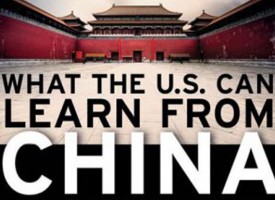 |
| Media Photo |
China is nonetheless still an emerging market country, and a source of cheap labour where people are flocking to the cities and where agriculture, the heart of the Cultural Revolution some time ago, has given way to other business activities. Ms. Lee notes the dictates of the grossly - indebted western powers to the emerging markets have mostly been destructive due to things like an Oriental high regard for education and its emphasis on Confucian thought. The western powers themselves apparently have financial troubles at this point due to immoral business practices, wealth inequalities, and inappropriate emphasis away from things like proper education / pedagogy and fair pay for a day's work. There are no guarantees in the world of democracy, but America has a long - standing waning of people participating in democracy itself through exercising their right to vote, and a waning itself of values on education and equalities. The U.S., apparently to Ms. Lee with respect to China is more like a plutocracy and / or an Alice in Wonderland.
As a response to the lack of success of the Cultural Revolution, the leadership in China has classically re - interpreted its lessons to place its legacy today on uniting the party to serve the Chinese people. This has the effect of making Chinese leaders more proactive and a view in the Orient of democracy as a tainted system at present. "Capitalism with Chinese Characteristics" in this text is a form of that system as helped by the state in calling for labour's drive to succeed and watching over the state and the enterprise, where decisions are centrally controlled and the people have a comprehensive business strategy including central planning. The closest thing to the Five - year Plan in China in the U.S. is apparently named as the federal budget process, and this process apparently suffers from, as do some other areas of the U.S. economy according to Ms. Lee, "short - termism," or myopia - the hedge funds that ballooned during the 2000's and then later had difficulties staying afloat are used to illustrate this.
Operating a business in the P.R.C. is referred to in the text as "Swimming with the Sharks," given the overall enormous success of the innovative enterprise zones and state - owned enterprises, that she incidentally suggests might be a good recipe for the U.S. Other difficulties are suggested concerning the American economy, including the manipulative villains who run some financial centers, lobbies and so forth. The commercial approach of China to Africa and Latin America is discussed as a successful "win - win" model of business development. In this narrative, only Israel, U.K. and Canada are supposed to be friends with the U.S., not too rosy a picture. The U.S. on the other hand is supposed to have excellent societal traits such as its sales people, a strong dollar, evident public cynicism, and the glamour of the media. Ms. Lee suggests goals currently being pursued in P.R.C. in the area of macroeconomics including eradicating hunger, increasing the wages of the working class, and avoiding tragedies such as that currently in the Sudan. She calls upon the growth models as preached by Soros, Rogoff, Summers, and Zoellick; including the consideration of a single global currency, and more effective use of S.D.R.'s. She also acknowledges China's sketchy human rights record and Nobel Prize winner Liu Xiao bo, ominous military developments in both the U.S. and China, and other politics of ascendancy. The text goes on to caution the reader about stagnation in China despite a bright and just future.
No comments:
Post a Comment